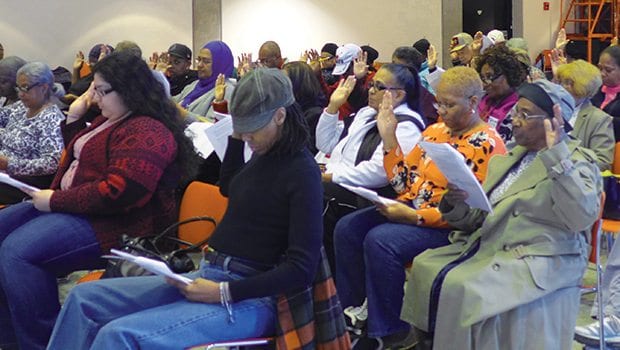
Democracy is maintained, in part, by patience, careful counting and enforcing Election Day rules.
On November 3, while city council candidate rev up their Election Day field operations, election officers, also known as poll workers, will be busy at 6 a.m. working to ensure the voting process run smoothly.
The hours are long: 6 a.m. to 9 p.m. Pay starts at $135 for the full day, about $9/hr. Election officers face the brunt of disgruntled voters.
So why choose to do this?
Election Day enthusiasm
“I love it,” said Juanita Jarrett at a well-attended election worker training session at Dudley Library last Monday. She is retired and said she likes the opportunity to be involved in her precinct.
Several attendees at the training session spoke of the excitement of seeing voters turn out, especially participating in their first election or the elderly for whom attendance may be more of a challenge.
Rose Brayboy, who has been an election officer for eight years, said when Obama was elected, “So many people at 7 a.m. wanted to vote [including] a whole lot of elders — people with canes and over 80.”
“I enjoy seeing the level of community participation in the election process,” she added. Brayboy is assigned to Curley School this year.
Many officers are frequent voters.
Martin Kain, senior administrative assistant for the Boston Election Commission, said when considering applicants for these position, he views active voter history as a sign of good character and familiarity with the process.
Jarrett said she gives people she knows a hard time if they do not vote.
“They come [to the polls] because they know I’ll be there,” she said.
Attendees reported years in the role. Corine Desseau said she has been an elections officer for a decade.
Poll-worker perspective
Election officers’ days start with inventory checks and posting signs and they end with ballot counting. While polls are open, the officers may be charged with checking voters in, offering instruction and answering questions.
Officers also are charged with knowing the ins and outs of rules, such as how to handle an absentee voter who now wants to vote in person or how near to the center campaigners are allowed to be.

Left to right: Gladys Triplett, Juanita Jarrett and Corine Desseau settled in for Election Officer Training.
Strained voters
A major challenge: aggravated voters. Tensions can flare when a voter discovers they are listed as “inactive” or assigned to a different precinct. Election officers have to be able to deal calmly and fairly with anyone they serve.
“Patience and respect for whoever you’re dealing with” are the most important skills for an election officer, said Brayboy.
Election officers also may find themselves navigating unexpected situations.
Brayboy said she served as election clerk at a Roxbury poll center when they ran out of ballots. When many voters regarded it as an attempt to prevent their neighborhood’s representation, she said she stepped in to reassure them that the issue was citywide.
With no instructions for handling such a situation, Brayboy had to improvise. She asked voters to sign in, and promised them that if they wanted to go home while the center waited for ballots, she would keep the polls open until everyone who wrote down their name returned.
On more typical election days, a mind for patient, methodical work is needed.
“It’s a lot of counting,” said Aqilla Manna of Roslindale. The work, if not glamorous, helps assure integrity in the process and protects against votes being lost or other errors. Officers must confirm the numbers of people checking in and checking out match and that the number of names checked off equal the number of ballots received, she said.
“The whole thing is 100 percent checks and ballots,” Manna said.
Only after numbers are confirmed, hand-counted ballots are tallied, spoiled ballots (ones that were mismarked and rejected by the voter) are counted and recorded and other related tasks completed can ballots be sent, in care of a police officer, to City Hall.
Overwhelming campaigners
The other chief challenge is managing overeager campaigners.
While politicking at the polls is forbidden, many campaigns make their presence known. A common appearance: trucks offering free coffee and donuts that are plastered over with campaign stickers, said Kain.
“Take whatever they give you and don’t feel compelled to vote for them,” he advised election officers at a training meeting.
Election officers also frequently must manage campaign supporters, some of whom may overlook or be unaware of rules designed to keep them from promoting their candidate at the poll centers.
Brayboy said work at the polls also gave an interesting perspective on candidates, as she was able to see which ones try hard to poster a precinct and others who assume it is not worth the effort.
Get involved
The need for election officers is increasing. Turnover rate has grown, Kain said, as many current workers move or have a change in work or life situation that reduces their availability. Officers often take the day off their primary jobs or are retired.
Boston especially needs officers who speak languages other than English, Kain said. Ballots are printed with both English and Spanish, as well as in Vietnamese and Chinese in some precincts. Currently, Boston supplements its multilingual officers by extending recruitment to include those not registered to vote in the Massachusetts, he said.
Many at the election training said they had learned of the position through friends or word of mouth. But, Kain emphasized, anyone can apply.






